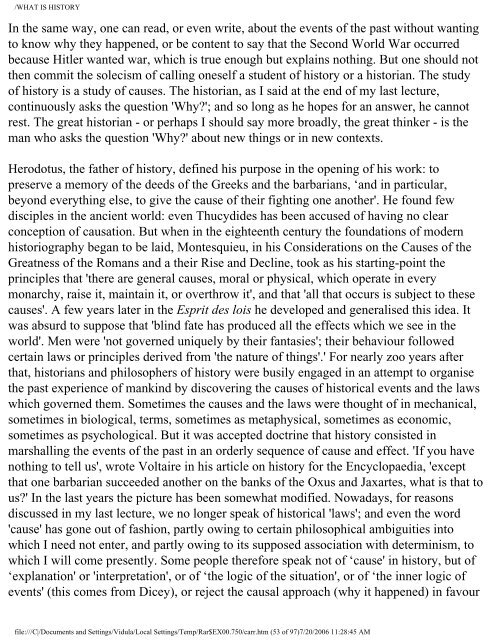What is History / by Edward Hallett Carr - Universal History Library
What is History / by Edward Hallett Carr - Universal History Library
What is History / by Edward Hallett Carr - Universal History Library
You also want an ePaper? Increase the reach of your titles
YUMPU automatically turns print PDFs into web optimized ePapers that Google loves.
WHAT IS HISTORY<br />
In the same way, one can read, or even write, about the events of the past without wanting<br />
to know why they happened, or be content to say that the Second World War occurred<br />
because Hitler wanted war, which <strong>is</strong> true enough but explains nothing. But one should not<br />
then commit the solec<strong>is</strong>m of calling oneself a student of h<strong>is</strong>tory or a h<strong>is</strong>torian. The study<br />
of h<strong>is</strong>tory <strong>is</strong> a study of causes. The h<strong>is</strong>torian, as I said at the end of my last lecture,<br />
continuously asks the question 'Why?'; and so long as he hopes for an answer, he cannot<br />
rest. The great h<strong>is</strong>torian - or perhaps I should say more broadly, the great thinker - <strong>is</strong> the<br />
man who asks the question 'Why?' about new things or in new contexts.<br />
Herodotus, the father of h<strong>is</strong>tory, defined h<strong>is</strong> purpose in the opening of h<strong>is</strong> work: to<br />
preserve a memory of the deeds of the Greeks and the barbarians, ‘and in particular,<br />
beyond everything else, to give the cause of their fighting one another'. He found few<br />
d<strong>is</strong>ciples in the ancient world: even Thucydides has been accused of having no clear<br />
conception of causation. But when in the eighteenth century the foundations of modern<br />
h<strong>is</strong>toriography began to be laid, Montesquieu, in h<strong>is</strong> Considerations on the Causes of the<br />
Greatness of the Romans and a their R<strong>is</strong>e and Decline, took as h<strong>is</strong> starting-point the<br />
principles that 'there are general causes, moral or physical, which operate in every<br />
monarchy, ra<strong>is</strong>e it, maintain it, or overthrow it', and that 'all that occurs <strong>is</strong> subject to these<br />
causes'. A few years later in the Esprit des lo<strong>is</strong> he developed and general<strong>is</strong>ed th<strong>is</strong> idea. It<br />
was absurd to suppose that 'blind fate has produced all the effects which we see in the<br />
world'. Men were 'not governed uniquely <strong>by</strong> their fantasies'; their behaviour followed<br />
certain laws or principles derived from 'the nature of things'.' For nearly zoo years after<br />
that, h<strong>is</strong>torians and philosophers of h<strong>is</strong>tory were busily engaged in an attempt to organ<strong>is</strong>e<br />
the past experience of mankind <strong>by</strong> d<strong>is</strong>covering the causes of h<strong>is</strong>torical events and the laws<br />
which governed them. Sometimes the causes and the laws were thought of in mechanical,<br />
sometimes in biological, terms, sometimes as metaphysical, sometimes as economic,<br />
sometimes as psychological. But it was accepted doctrine that h<strong>is</strong>tory cons<strong>is</strong>ted in<br />
marshalling the events of the past in an orderly sequence of cause and effect. 'If you have<br />
nothing to tell us', wrote Voltaire in h<strong>is</strong> article on h<strong>is</strong>tory for the Encyclopaedia, 'except<br />
that one barbarian succeeded another on the banks of the Oxus and Jaxartes, what <strong>is</strong> that to<br />
us?' In the last years the picture has been somewhat modified. Nowadays, for reasons<br />
d<strong>is</strong>cussed in my last lecture, we no longer speak of h<strong>is</strong>torical 'laws'; and even the word<br />
'cause' has gone out of fashion, partly owing to certain philosophical ambiguities into<br />
which I need not enter, and partly owing to its supposed association with determin<strong>is</strong>m, to<br />
which I will come presently. Some people therefore speak not of ‘cause' in h<strong>is</strong>tory, but of<br />
‘explanation' or 'interpretation', or of ‘the logic of the situation', or of ‘the inner logic of<br />
events' (th<strong>is</strong> comes from Dicey), or reject the causal approach (why it happened) in favour<br />
file:///C|/Documents and Settings/Vidula/Local Settings/Temp/Rar$EX00.750/carr.htm (53 of 97)7/20/2006 11:28:45 AM







